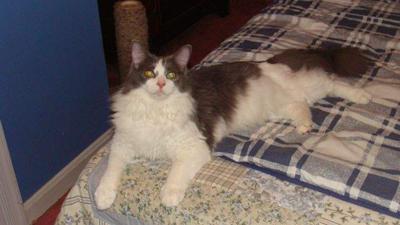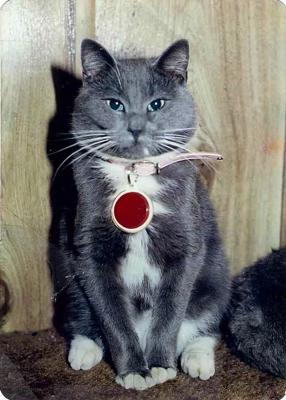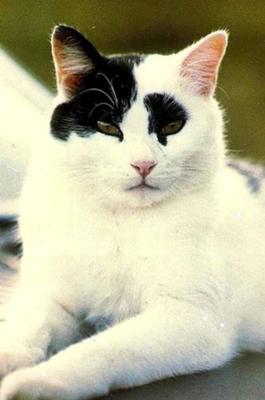by Elisa Black-Taylor
(USA)

Molly at Foothills Shelter
FeLV positive adoptable cats, especially those in shelters, more often than not have a poor chance of adoption due to the nature of the disease. This doesn't have to be a death sentence for a cat!
I was asked to do this article in hopes of helping some FeLV+ adoptable cats find a forever home. I've read a lot on the subject over the years. I've also had three cats with the disease. One died after being attacked by a pack of dogs. The other two died of the disease itself. Back in the early 1990's I lost two cats who had tested positive five years before their deaths.
I've had a few people tell me having a FeLV+ cat living in a home with a cat who has tested negative isn't much of a risk to the healthy cat. I really can't be the judge of that. I can tell you that over a fifteen year period, having dozens of cats who lived inside, only three became infected.
Of course it stands to reason that the vaccine must be given to any cats in the home before a FeLV+ cat is even considered for adoption. The vaccine isn't 100% effective, but it comes close.
Our shelters are full of FeLV cats and kittens. Some have contracted it through contact with other cats. Others had it passed to them through a pregnant mother cat.
Unless a FeLV+ cat can be adopted into a private home or a rescue solely for FeLV/FIV cats, euthanasia is quite common. When I first began rescue I was asked to take in an infected cat. Due to the number of cats in my home I had to refuse. It's always more of a danger in multi-cat households.
If I only planned on giving a home to one or two cats, FeLV cats would be at the top of my list. It's NOT a death sentence as many believe. Just read up on the subject. To me FeLV simply means taking extra precautions both on a nutritional level as well as when an illness presents itself. There are a lot of good supplements out there to peak a cats immune system. A FeLV+ cat lover also needs to be extra tuned in to their cats health. Take the cat to the vet at the first sign of illness, as immune system problems are what cause most of the serious health problems common with the disease.
As I said earlier, I watched two of my cats succumb to the disease. My cat Spot was 15 when he went to the Rainbow Bridge. I'd had him for 12 years. His developed into cancer, which is quite common. I watched him go from an 18 pound cat to under 5 pounds at the time of his death. He never really showed signs of ill health. He was a loving lap cat throughout his life. He simply lost weight until there was no more weight to lose. He died eating a bowl of his favorite sardine flavored cat food.
Buster died in much the same way. Although he never developed cancer, he wasted away from a 15 pound cat to under 4 pounds. He, like Spot, had a healthy appetite right up until the end. The weight just wouldn't stay on him.
I've never regretted having Buster and Spot. It was hard watching them die, but they had a good life.
Anytime we adopt a cat we're taking a chance. We never know what illnesses or diseases they will develop over time.
There are FeLV+ cats in shelters everywhere. They're not any less lovable than other cats. They're certainly just as beautiful. Without a loving home and someone willing to take a chance on them, they have no chance.
Take a look at Molly. She's in a shelter right now waiting on someone to take a chance on her. Foothills Shelter is a private 501c3 animal shelter located in Columbus, NC and is the only shelter in Polk County. This shelter is currently home for Molly, a sweet stray who has tested FeLV positive. To adopt or rescue Molly please contact Foothills Humane Society, 989 Little Mountain Road • Columbus, NC 28722 • Phone: (828) 863-4444.
Coco is aFeLV positive adoptable cat and is available from Wilderness Cat Rescue in Fredericksburg, Virginia. Here's a link to the information on their rescue. http://www.petfinder.com/shelters/VA536.html. They also offer feral barn cats. This rescue sees the importance of finding homes for cats that aren't the most desirable for the majority of those wishing to adopt.
For anyone hoping to adopt in the near future, please do some research and see if a FeLV+ cat can become a part of your family. They deserve a forever home as much as cats born healthy.
Should you decide on one of the beautiful cats or if you have a cat living with FeLV I'm happy to inform you there are support groups out there. These groups discuss the issues these cats and their owners face regarding FeLV.
Readers, do any of you live with a FeLV positive cat? Is there any information you'd like potential adopters to know? Any misconceptions that need to be cleared up? I welcome your input.
Elisa









I just rescued a cat from the outdoors. She is 5 years old, neutered, and very loving. The vet showed us the Feline Leukemia test stated positive but the color was barely visible and she has no symptoms. He suggested we did not alliw her with our other cat. We should think of sending her to a shelter. QUESTION… What are your thoughts since your positive cat lives with your other cats? We are presently at a lose at what to do. Thanks
Good for you Susan. Because of you he has great life by the sound of it. I wish there were more people like you.
I have a healthy 2 year old leukemia positive cat running with my other 5 that are not positive. He is healthier then the rest. Energetic and always on the go. I am a firm believer that if they are not showing signs that they can lead a full life.